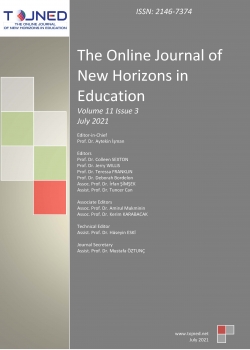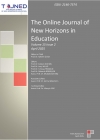TOJNED - Volume 11 - Issue 3 - July 2021
 EVALUATION OF THE TECHNOLOGICAL COMPETENCES OF PRIMARY SCHOOL TEACHERS 1
EVALUATION OF THE TECHNOLOGICAL COMPETENCES OF PRIMARY SCHOOL TEACHERS 1 Osman Vaiz, Hüseyin Minalay, Ayhan Türe, Pelin Ülgener, Hasan Yaşar, Anıl M. Bilir
Abstract:
The most important missions of educational institutions are to raise individuals who have the knowledge and skills that society needs. The development of technology every day has enabled it to develop in this direction in education. So the inclusion of technology in education is effective in the development of students' knowledge and skills. However, for this, teachers must have sufficient technological knowledge and competence. The aim of this study is to evaluate teachers' awareness of technological competence. The research was conducted with the case study design, which is one of the qualitative research methods. Semi-structured interview form was used as a data collection tool in the study, which was carried out with the participation of 11 teachers from TRNC primary schools. Content analysis method were used for the obtained findings . As a result of the research, it was determined that the participants defined educational technologies as internet use, technology integration, and digital resource use.
 HOMELESS PEOPLE AND BOARDING SCHOOL IN NIGERIAN EDUCATION: PROBLEMS AND MANAGEMENT STRATEGIES
HOMELESS PEOPLE AND BOARDING SCHOOL IN NIGERIAN EDUCATION: PROBLEMS AND MANAGEMENT STRATEGIES Rotkangmwa Juliana Bodang, Michael Olarewaju Ogun dele
Abstract:
This study examine the educational intervention through managing effective boarding house system for tackling challenging homeless schools in Nigeria. The paper noted that Nigeria is a country with a population of 180million people are challenged by high members of homeless people which led to overcrowded homes in the country. However, the challenges of the inadequate homes have devastating effects on the life and prosperity of the citizens. The paper however intends to investigate the strategies for managing Boarding house system by the government and the stakeholders in education, the causes of homeless students, challenges and methods of amelioration using effective operation of the Boarding system at the secondary Education level in Nigeria.
 SOCIAL EFFECTS OF FILM AND TELEVISION
SOCIAL EFFECTS OF FILM AND TELEVISION Demet KARAKARTAL
 THE DISTANSE TRAINING OF STUDENTS IN GRAPHIC DISCIPLINES USING STEP-BY-STEP OPERATION CARDS 4
THE DISTANSE TRAINING OF STUDENTS IN GRAPHIC DISCIPLINES USING STEP-BY-STEP OPERATION CARDS 4 Natalya MICHUROVA, Dmitry MIROSHIN
Abstract:
The article deals with the organization and implementation of student's distance training to perform graphic tasks in the framework of the academic discipline "Engineering graphics". To ensure the graphic skills formation, we offer cards of step-by-step operations, which describe and illustrate step-by-step the algorithm of the student's activity in performing a typical task. The structure of cards of step-by-step operation is presented, consisting of coordinating, information-activity and control blocks. A content description and each block purpose of the step-by-step operation cards is provided. Organizational issues and methods of conducting training sessions with the use of step-by-step operation cards are described, which includes four main the teacher and student's work stages. For the distance learning organization, the ZOOM Internet video communication system is offered, in which classes are held online. The article describes the course of experimental work on the application of the developed methodology and cards of step-by-step operations in the student's remote training framework to perform graphic tasks in the academic discipline "Engineering graphics" using the ZOOM Internet video communication system. The experimental work tabulated results are presented, confirming the high efficiency of the developed methodology and methodological support - cards of step-by-step operations.
 THE EFFECTS OF READING FOR PLEASURE ON EFL STUDENTS’ READING COMPREHENSION
THE EFFECTS OF READING FOR PLEASURE ON EFL STUDENTS’ READING COMPREHENSION Mohammad Mahdi Kazemi
Abstract:
Reading is one of the most significant skills, especially for EFL student. These days, many students do not have the reading skills needed to do effective work in their crosses. In this regard, pleasure reading helps students to communicate, listen, and most importantly, to express themselves freely and moreover, it allows them to acquire a specific language skill. This is why reading for pleasure is very important. This paper explores the importance and the impact of reading for pleasure on reading comprehension. This experimental study was conducted in a language institute with 21 English EFL students. The experimental group was given texts for their selection on various topics which they are interested in, while the control group has read texts which were in their book. The duration of the experiment was 15 sessions (5 weeks). Pre-test and post-test were implemented to identify the degree of improvement of the students’ reading comprehension skill. Finally, the experimental group showed better improvement of comprehension skill.
 THE ROLE OF LEARNING MOTIVATION IN MEDIATING LEARNING OUTCOMES
THE ROLE OF LEARNING MOTIVATION IN MEDIATING LEARNING OUTCOMES Agung Listiadi
Abstract:
Education is an effort to realize the ideals of the nation. To achieve good education, learning facilities, teacher teaching skills, interest in learning and learning motivation are needed. Learning facilities are needed by schools to be right on target and effective in their use. The effectiveness of the provision of learning facilities can improve the quality of learning. Besides that, in creating fun, effective, and innovative learning, a teacher needs a skill. If students have an interest in the teaching material being studied, they will study seriously and can obtain optimal learning outcomes because they like it and will feel satisfied when their wishes have been fulfilled. Respondents in this study were 80 student teacher candidates. The study used a path analysis design. The results of the study of learning motivation mediate learning facilities, teacher teaching skills and learning interest on learning outcomes.
 THE SUPERVISION IN DISTANCE EDUCATION: E-SUPERVISION
THE SUPERVISION IN DISTANCE EDUCATION: E-SUPERVISION Osman Vaiz, Hüseyin Minalay, Ayhan Türe, Pelin Ülgener, Hasan Yaşar, Anıl M. Bilir
Abstract:
The development of technology has affected education as well as many other sectors. The development of technology, education programs are rearranged and adapted to today's conditions. Due to the pandemic experienced, education has been moved to online platforms in many countries around the world and education is carried out with distance education models. Effective and efficient use of distance education practices is important in terms of sustainability and not interruption of education. At this point, the importance of supervision comes to the fore once again. This research examines the concept of supervision in the distance education process and the emerging e- supervision concept. In the study conducted with the document analysis method, which is one of the qualitative research methods, the relevant literature was examined and the findings obtained were discussed. As a result of the research, it has been revealed that the advantages of distance education also provide opportunities for e-supervision facilitate control, eliminate time and place concepts, and create an easier communication network between supervisors, teachers and school administrators.
 UNDERGRADUATES’ ACUITY TOWARDS THE USE OF FACEBOOK FOR LEARNING
UNDERGRADUATES’ ACUITY TOWARDS THE USE OF FACEBOOK FOR LEARNING Ahmed Idris ISSA, Amos Ochayi ONOJAH, Isiaka Ayobi RAHEEM, Babatunde Sodiq AWEDA, Adenike Aderogba ONOJAH
Abstract:
This study examined undergraduates’ perception on the use of Facebook for learning with reference to gender and specialization. A researcher designed structured questionnaire which was validated by three experts was used for data collection from 300 undergraduate students. Mean and percentage for research questions. Hypotheses 1 was tested using independent t-test while hypotheses 2 was tested using ANOVA at 0.05 level of significance.The findings of this study showed that: (i) Undergraduates have the right perception towards the use of Facebook for learning (2.94). (ii) There was no significant difference between male and female perception towards the use of Facebook for learning [t= 0.635, p>0.05]. (iii) There was no significant difference among undergraduates based on course of study on use of Facebook for learning [F (2,99) 1.46, p>0.05]. The study concluded that undergraduates have positive perception towards the use of Facebook for learning. The study recommends that the government should include the use of social media applications among the methods of lesson delivery.
 UTILIZATION OF SMARTPHONE IN TEACHING AND LEARNING PROFESSIONAL EDUCATION COURSES
UTILIZATION OF SMARTPHONE IN TEACHING AND LEARNING PROFESSIONAL EDUCATION COURSES Helen B. Boholano, Bernard Evangelicom V. Jamon, Roberto Cajes, George Stewart Q. Boholano
Abstract:
The use of instructional materials is an essential in the classroom. It is when you plan what learning materials will be used in order to achieve your goal or whatever you aim for. Professional education instructors/professors look for the best way to help our learner’s on how they could learn and comprehend better with the basic fundamental skills. The aim of this study is to find the effects using smartphone in teaching and learning professional education courses in Teacher Education. The study utilized the mixed method of qualitative and quantitative methods. Qualitative part falls more on studying human behavior and reasons that govern to such behavior. For the quantitative part, the researchers check on the numbers of students who better understands English using smartphone. The study participated by the Bachelor in Elementary Education students. Researchers found out that integrating smartphone in teaching and learning can enhance the effectiveness of the students in learning the different teaching skills. Thus, the study concluded that the used of smartphone in the classroom settings was integral part to the learning of the students. The teachers may see to it that integrating smartphone in their teaching will help students use High Order Thinking skills (HOTS) as it makes them harness search skill by searching information online and will allow them to conceptualize the right information.


